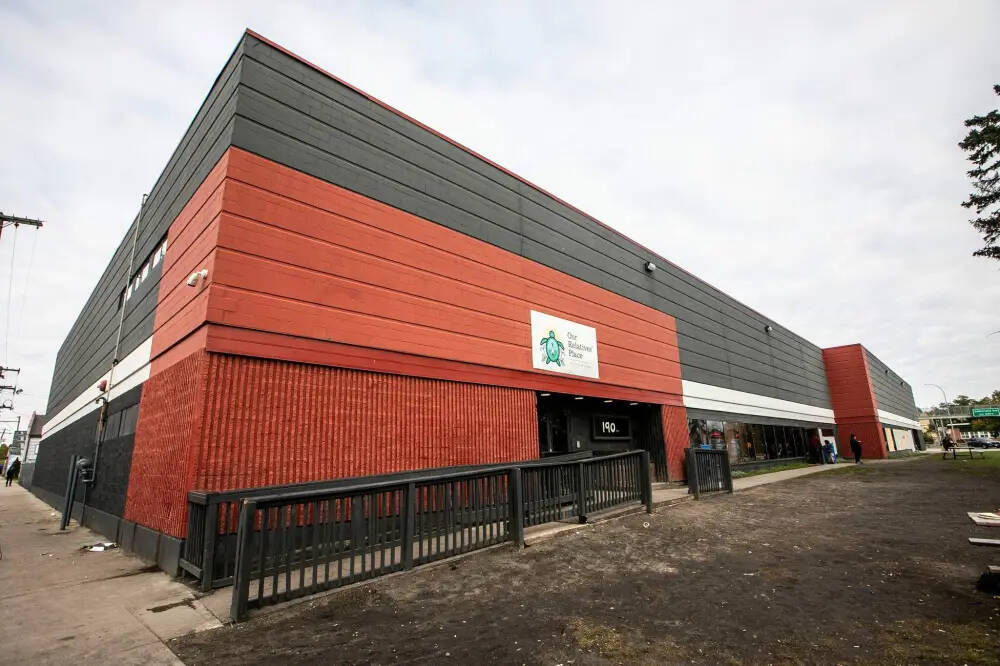Drug detox centre opening on hold ‘to get things right,’ Kinew says
Advertisement
Read this article for free:
or
Already have an account? Log in here »
To continue reading, please subscribe:
Monthly Digital Subscription
$0 for the first 4 weeks*
- Enjoy unlimited reading on winnipegfreepress.com
- Read the E-Edition, our digital replica newspaper
- Access News Break, our award-winning app
- Play interactive puzzles
*No charge for 4 weeks then price increases to the regular rate of $19.95 plus GST every four weeks. Offer available to new and qualified returning subscribers only. Cancel any time.
Monthly Digital Subscription
$4.99/week*
- Enjoy unlimited reading on winnipegfreepress.com
- Read the E-Edition, our digital replica newspaper
- Access News Break, our award-winning app
- Play interactive puzzles
*Billed as $19.95 plus GST every four weeks. Cancel any time.
To continue reading, please subscribe:
Add Free Press access to your Brandon Sun subscription for only an additional
$1 for the first 4 weeks*
*Your next subscription payment will increase by $1.00 and you will be charged $16.99 plus GST for four weeks. After four weeks, your payment will increase to $23.99 plus GST every four weeks.
Read unlimited articles for free today:
or
Already have an account? Log in here »
The provincial government has hit pause on opening the Point Douglas drug detox centre, which was expected as early as next week.
After Bill 48 — the contentious Protective Detention and Care of Intoxicated Persons Act — was passed Nov. 6, Premier Wab Kinew said the facility’s doors could be open in as little as two weeks.
The legislation will allow the centre to hold people experiencing methamphetamine psychosis and the violent effects of other street drugs for up to 72 hours.

Mikaela MacKenzie/Free Press files
The planned opening of the Point Douglas drug detox centre has been paused.
Kinew said Thursday that the timeline has been pushed back to ensure proper training and protocols are in place.
“We’re taking a serious step to keep people safe in the community from the impacts of meth,” he said when asked to explain the reason for the delay.
“As a result, the physicians and health-care folks, the social organizations like Main Street Project that we’re working with on this, are asking that we get the right training in place, the right protocols.
“When we’re talking about something as serious as depriving people of the ability to leave this centre for three days, I think it’s important that we get those things right.”
The act replaces the Intoxicated Persons Detention Act and extends the amount of time people under the influence of narcotics can be detained.
The current 24-hour maximum in the legislation adopted in 1987 was based on alcohol, not drug, consumption.
Bill 48 was introduced by the government on Oct. 2 and rushed through the legislature to get it passed by the Nov. 6 end of session.
It says that an intoxicated person in a public place who poses a danger or is causing a disturbance may be detained by the police or a designated officer and held at a detention location or protective care centre.
The 72-hour hold applies only to a “protective care centre”; the maximum remains 24 hours in any other facility.
While at a designated centre, individuals can be detained for up to 72 hours and, if they continue to be intoxicated after 24 hours of detention, they must be assessed by a health-care professional.
They must be released before the detention period expires if they are no longer intoxicated or if someone takes responsibility for their care.
While detained at a protective care centre, a health professional may require that they be taken for an involuntary medical examination. A person may also be allowed to voluntarily remain in a protective care centre to receive care or services once they are no longer intoxicated.
Kinew said the regulations for the new law were enacted Wednesday.
They designate protective care centres as Class 1, that include 72-hour detention facilities and Class 2, for 24-four detention.
Class 1 centres are listed at 190 Disraeli Fwy. and 200 Disraeli Fwy.
Class 2 or 24-hour centres are listed at 75 Martha St. (Main Street Project), 179 Doncaster St. (Manitoba Adolescent Treatment Centre), 462 Provencher Blvd. (Youth Addictions Stabilization) and the Wellbriety Centre in Thompson.
Designated officers to administer the act include community safety, First Nations and institutional safety officers as well as members of the Winnipeg Police Service auxiliary cadet program who’ve been appointed special constables.
The regulations state that health professionals who may conduct an assessment include a registered paramedic, nurse, psychiatric nurse or physician.
Kinew wouldn’t provide a new timeline for opening the 72-hour protective care centre Thursday but said he expects “having folks who are under the influence or who are needing help with addictions in December.”
carol.sanders@freepress.mb.ca

Carol Sanders
Legislature reporter
Carol Sanders is a reporter at the Free Press legislature bureau. The former general assignment reporter and copy editor joined the paper in 1997. Read more about Carol.
Every piece of reporting Carol produces is reviewed by an editing team before it is posted online or published in print — part of the Free Press‘s tradition, since 1872, of producing reliable independent journalism. Read more about Free Press’s history and mandate, and learn how our newsroom operates.
Our newsroom depends on a growing audience of readers to power our journalism. If you are not a paid reader, please consider becoming a subscriber.
Our newsroom depends on its audience of readers to power our journalism. Thank you for your support.







